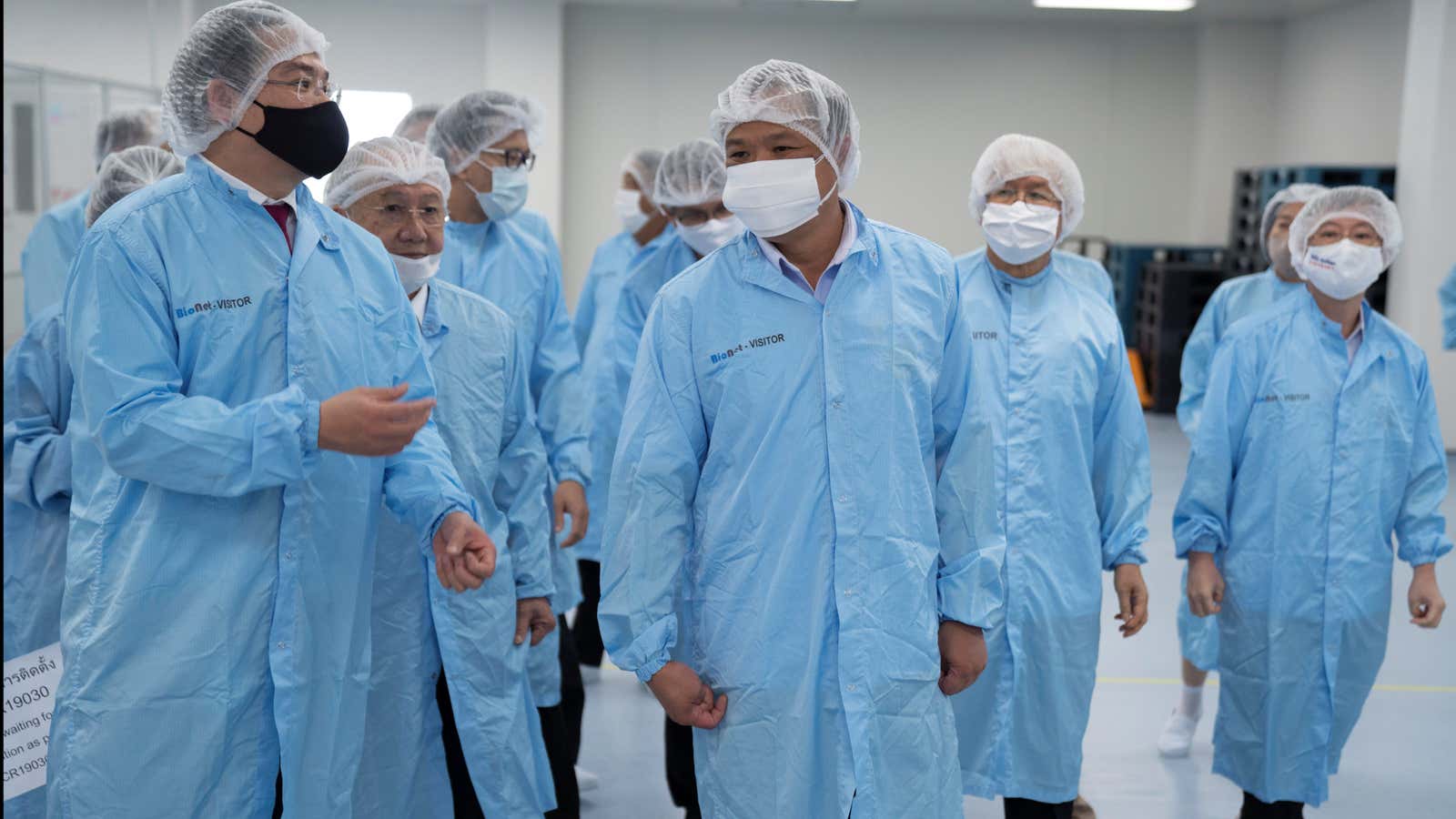In what could be the perfect picture (or, screenshot) of the spring of 2020, 12 heads of state, plus some high profile VIPs, are attending a virtual coverage hosted by the UK government today. It’s about vaccines.
The event is to support GAVI (the Global Alliance for Vaccines and Immunizations), an international partnership created to help low- and middle-income governments provide vaccines for their populations at a subsidized cost. GAVI, whose budget is funded every five years, is seeking $7.4 billion to carry on its program until 2025, and the renewal could not have fallen at a more appropriate time: There may never have been another moment when vaccines where this much of a priority for every government.
Among the leaders attending are Justin Trudeau of Canada, Shinzo Abe of Japan, Erna Solberg of Norway, Giuseppe Conte of Italy, Boris Johnson of the UK, Sahle-Work Zewde of Ethiopia, and Sheikh Hasina of Bangladesh. They’re joined by Bill Gates, UNICEF director Henrietta Fore, and GlaxoSmithKline’s CEO Emma Walmsley.
The number of global leaders in attendance speaks to their eagerness to publicly support global vaccine coverage. The reason is simple: the only solution to a pandemic is global cooperation between health systems.
“Covid-19 anywhere is Covid-19 everywhere,” Melinda Gates told Quartz. “We are a global community.” The Bill and Melinda Gates Foundation pledged $1.6 billion for GAVI’s main budget, as well as an additional $100 million specifically to purchase Covid-19 vaccines when available.
But it’s not so much generosity that seems to have moved these countries to come together, but rather the understanding that their own health is interlinked with the health of others.
For years, the refrain of global health professionals has been that investing in the health systems of developing countries was going to be the safest insurance against a pandemic, even for rich countries. Coronavirus has provided very tangible evidence to support that theory. Thus, equitable access to vaccines in poor countries is essential for the health of rich ones, too.
“[Coronavirus] has hit so close to home; we never had a time in the world where we’ve all been sheltering in place,” Gates said. “I think many of the global leaders are seeing it in their own communities. They’re seeing it in their own countries, quite frankly, they’re seeing it in their own family.”
While it has shown all the vulnerability of an interconnected world, Covid-19 is another reminder global threats can’t be solved locally: The virus likely won’t disappear, even with a vaccine, until it can circulate amongst non-vaccinated populations.
GAVI is only one example of the power of international responses. Another would be the Center for Epidemic Preparedness (CEPI), an initiative involving several governments, including Australia, Mexico, the UK, Japan, and Ethiopia, together with private donors and foundations, to invest in the search of treatments for emerging diseases. CEPI is currently funding research for nine different vaccines for Covid-19.
After a political season where countries around the world chose movements that fomented anti-international sentiment and the strengthening of borders—Brexit; the growth of xenophobic populism in France, Italy, and Germany; the US’s anti-immigration platform—a newfound interest in international cooperation seems to be emerging.
This collaboration, for instance, is showing world leaders it isn’t enough for vaccines to eventually be accessible for everyone, but there needs to be global coordination in how they are deployed. Protecting vulnerable populations everywhere, for instance, is more important than protecting the entire population in one country. “We start with the 60 million healthcare workers,” Gates said, “and then you start tiering to your most vulnerable populations in all the countries around the world.”
There is, of course, an important exception to the re-embrace of multilateralism—the US. As other countries pull together, and seek global coordination, president Donald Trump announced he was pulling out of the World Health Organization (WHO). Although so far it’s been a merely symbolic act, with no legal action taken yet, it is in remarkable contrast with the actions of other leaders.
“[The WHO] is not a perfect institution by any means, but you don’t pull out of it in the middle of a pandemic; that’s what it’s set up for” Gates said.
Pretty much all other leaders in the world, she said, as well as the US Congress, are seeing the need for collaboration. “You’ve got one outlier in this conversation right now,” she said.
